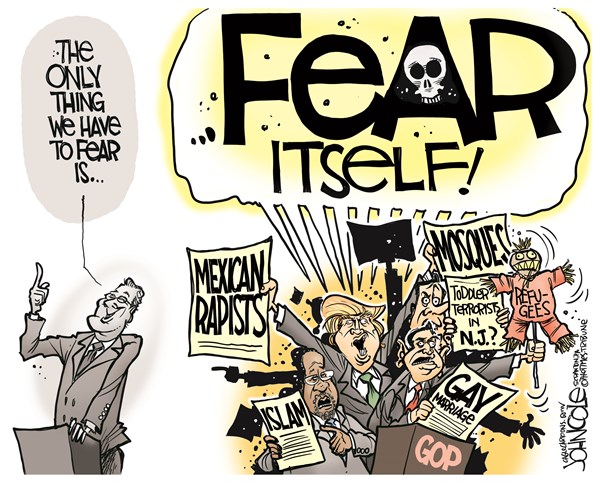
Fear and Loathing in New Hampshire
By John L. Micek
One of the great things about the winnowing of the 2016 presidential field over the last week is that it’s making it much easier to figure out which candidate is supposed to scare voters the most.
If you listen to Republicans Donald Trump, Marco Rubio and Ted Cruz, the putative front-runners of the GOP field, each claim that they’re the candidates Democrats should fear most.
And no less a personage than former U.S. House Speaker Newt Gingrich, who knows from frightening people, says Republicans should be worry less about Hillary Clinton and more about feeling “The Bern.”
So many choices – so many candidates for Republicans and Democrats to tremble before if one of them, Heaven forfend, actually wins their party’s respective nomination and then… horrors… the White House in November.
And while a lot of this rhetoric is clearly aimed at energizing the Republican and Democratic bases against the gladiatorial background of the primary season, its net effect on our politics is incredibly corrosive.
Think about it: How many times over the last 10 years have you heard someone you know shake their heads and disgust and proclaim, “He’s not my president… I didn’t vote for him.”
It happened among Democrats under the administration of George W. Bush and more viscerally among Republicans under Barack Obama.
But heck, there were probably Virginia planters who said the same thing about George Washington. And opposition to Abraham Lincoln was deep-seated as well.
Regardless of who wins in November, Democrat or Republican, he or she will be the president of the entire United States — and not just whatever percentage of party loyalists who cast ballots on their behalf.
But to hear the debate, both on the campaign trail and around the dinner table, that’s hardly the case. Unfortunately, Americans are more entrenched than ever – as some sobering Pew Research Center data makes clear.
For instance, the average partisan gap in presidential approval ratings since the Eisenhower administration has leaped from an average of 39 points to a staggering 67 points under Obama, the Pew research found.
In 1952, a plurality of Democrats (49 percent) liked Ike, compared to 88 percent of Republicans. By the time of Obama, 81 percent of Democrats approved of the nation’s first black president, compared to a mere 14 percent of Republicans in 2010.
As a result, it’s now not enough to merely disagree with a candidate and where he or she stands on the issues. One must certifiably loathe them and want to work actively to see their ideas defeated and destroyed.
“Many in each party now deny the other’s facts, disapprove of each other’s lifestyles, avoid each other’s neighborhoods, impugn each other’s motives, doubt each other’s patriotism, can’t stomach each other’s news sources, and bring different value systems to such core social institutions as religion, marriage and parenthood. It’s as if they belong not to rival parties but alien tribes,” says researcher Paul Taylor.
What’s driving all this change? One of the biggest factors is changing demographics.
As Taylor notes, America will be majority non-white (probably by 2050), and “at the same time, a record share of Americans are going gray. Together, these overhauls have led to stark demographic, ideological and cultural differences between the parties’ bases.”
And the political parties reflect that, he notes, with each becoming more ideologically entrenched and increasingly influenced by their ideological extremes.
In the meantime, those two camps are increasingly likely to seek out media that reflects their specific worldview.
Forty-seven percent of those who identify themselves as “consistently conservative,” say their main source of information is Fox News, while 15 percent of those who identify as “consistently liberal” get their news from a close mix of CNN, NPR and CNN (15, 13 and 12 percent, respectively).
What we lose as a result of this bunker mentality is that one thing that’s absolutely essential to a well-functioning democracy: The ability to reach common ground and to compromise to solve our problems.
Fear and loathing on the campaign trail might be the path to the nomination. But as any political pro will tell you, there’s a big difference between campaigning and actually governing.
There, fear loses – every single time.
——
© Copyright 2016 John L. Micek, distributed by Cagle Cartoons newspaper syndicate.
An award-winning political journalist, Micek is the Opinion Editor and Political Columnist for PennLive/The Patriot-News in Harrisburg, Pa. Readers may follow him on Twitter @ByJohnLMicek and email him at [email protected].
















